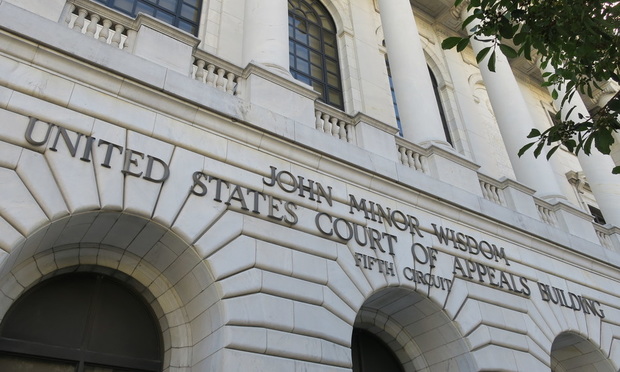Former Texas Judge Fails in Bid to Overturn Bribery Conviction
The U.S. Court of Appeals for the Fifth Circuit rejected former Texas judge Angus McGinty's attempt to overturn his federal bribery conviction, dismissing the argument that his own criminal defense attorneys had a conflict because they were allegedly suspects in the same corruption investigation that lead to McGinty's conviction.
August 21, 2018 at 04:59 PM
6 minute read
 U.S. Court of Appeals for the Fifth Circuit. Credit: Mike Scarcella / ALM
U.S. Court of Appeals for the Fifth Circuit. Credit: Mike Scarcella / ALM
The U.S. Court of Appeals for the Fifth Circuit rejected former Texas judge Angus McGinty's attempt to overturn his federal bribery conviction, dismissing the argument that his own criminal defense attorneys had a conflict because they were allegedly suspects in the same corruption investigation that lead to McGinty's conviction.
McGinty, who served as state district court judge in San Antonio from 2011 until his resignation from the bench in 2014, pleaded guilty to one count of honest services wire fraud in 2015 and was sentenced to two years in prison.
According to the Fifth Circuit's Aug. 17 decision, the investigation that lead to McGinty's conviction began with a tip from an FBI informant that former San Antonio criminal defense attorney Albert Acevedo Jr. was paying for repairs to McGinty's car in exchange for favorable rulings. Acevedo in 2015 pleaded guilty to bribery and was sentenced to one year in prison.
Acevedo provided McGinty with $6,655 in car-related services and intercepted communications showed that McGinty agreed to remove alcohol monitoring for one of Acevedo's clients and recalled an arrest warrant for another, according to the decision.
Acevedo later agreed to cooperate with the FBI and then made myriad allegations, including that he was not the only attorney with influence in McGinty's court and named defense attorneys Alan Brown and Jay Norton as examples.
The decision noted that Acevedo's and McGinty's allegations against Brown and Norton “are nothing more than allegations,” and that the FBI investigated and could not substantiate them.
After McGinty's indictment in 2014 on numerous bribery-related charges, McGinty retained Brown and Norton—the same two lawyers Acevedo had identified to the FBI—to represent him. While McGinty's case was pending, the government filed a notice of potential conflict of interest explaining that Brown also represented another defendant whom Acevedo had previously represented in state court.
According to the Fifth Circuit, the district court judge personally addressed McGinty during a status hearing and told him the government had raised a potential conflict, and said McGinty had a right to conflict-free counsel. McGinty said he understood and wanted to proceed with Brown and Norton. He later signed a plea agreement stating that he was fully satisfied with the attorneys' representation.
In 2015, McGinty requested an interview with FBI agents, in which he stated he had received other favors from several lawyers while serving as a judge, singling out Brown and Norton, and alleging the two attorneys had given him cash and free legal representation, the decision said. McGinty also alleged that he initially wanted to cooperate with the government but that Brown and Norton had convinced him not to. McGinty also speculated that Brown and Norton advised him to plead guilty to protect themselves.
The FBI was unable to substantiate McGinty's allegations against his attorneys, and a search of McGinty's text messages turned up nothing incriminating, and ultimately the government declined to bring charges against Brown and Norton, according to the court.
McGinty later sought to vacate his guilty plea on the grounds his defense counsel had discouraged him from the cooperation that would have been beneficial to him. Specifically, McGinty argued that Brown and Norton were suspects in the FBI's corruption investigation and that this conflict violated his Sixth Amendment right to counsel.
The trial court denied McGinty relief, holding that his ineffective assistance claim failed to meet the standard announced in the seminal 1984 Supreme Court ruling in Strickland v. Washington. He appealed to the Fifth Circuit.
On appeal the government argued that even if McGinty's attorneys were constitutionally deficient, he waived his right to nonconflicted counsel. McGinty argued that not all conflicts are waivable, and the conflict he alleged is unwaivable.
The Fifth Circuit sided with the government, concluding that McGinty “knowingly, intelligently, and voluntarily waived the purported conflict.”
In his decision, Judge Stephen Higginson noted that McGinty's case appeared to be the first time the Fifth Circuit has considered an implicit waiver of an attorney conflict, but they had upheld analogous waivers.
“The uncontested record also shows that McGinty was aware of the alleged conflict. The government asserts, relying on an affidavit from an FBI agent, that McGinty told investigators that Brown and Norton had given him favors in exchange for rulings in the past,” Higginson wrote. “McGinty cannot create an issue of fact by dancing around his own statements.”
“Because McGinty failed, despite ample opportunity, to contest the veracity of his own prior statements of collusion with Brown and Norton, the district court and we are entitled to rely on them,” Higginson wrote. “We therefore have no trouble concluding that, if McGinty's attorneys had a conflict, the uncontested facts show that McGinty opportunistically knew, even took advantage of, that fact better than anyone.”
“Whether or not that approach was ultimately wise, the record shows that it was intelligent, knowing, and voluntary,” Higginson concluded in the decision. “Accordingly, we hold that McGinty waived Norton and Brown's purported conflict.”
David Gonzalez, an Austin attorney who represents McGinty, said his client will likely appeal the Fifth Circuit's decision. Gonzalez said his primary concern with the court's ruling is the finding that McGinty implicitly waived his right to conflict-free counsel without a formal hearing on that issue from the trial court.
“Now for the first time they are saying because he is a judge and he is smart and sophisticated, we don't go through the same hearing process as other defendants to ascertain whether there is a conflict,” Gonzalez said.
“It was not disclosed to McGinty that his lawyers were mentioned by several witnesses to have exposure in the same criminal investigation. That's the problem,” Gonzalez said.
“McGinty's lawyers never did anything wrong. That's really clear,” Gonzalez added. “But at the beginning of the investigation when they were named, can that create a conflict? That's the issue. They really worked hard and helped him. They were mentioned as suspects, but McGinty didn't know that.''
Brown and Norton both did not return calls for comment.
McGinty was prosecuted by the New Mexico U.S. Attorney's Office after the U.S. Attorney's Office for the Western District of Texas recused itself.
“The Fifth Circuit opinion affirming the bribery conviction of former judge Angus McGinty should serve to reaffirm the public's trust in the integrity of our judicial system,” said U.S. Attorney John C. Anderson of the District of New Mexico. “Fairness and impartiality are at the very core of our system of justice, and judges who accept bribes and compromise those values must be held accountable.”
This content has been archived. It is available through our partners, LexisNexis® and Bloomberg Law.
To view this content, please continue to their sites.
Not a Lexis Subscriber?
Subscribe Now
Not a Bloomberg Law Subscriber?
Subscribe Now
NOT FOR REPRINT
© 2025 ALM Global, LLC, All Rights Reserved. Request academic re-use from www.copyright.com. All other uses, submit a request to [email protected]. For more information visit Asset & Logo Licensing.
You Might Like
View All

Eversheds Sutherland Adds Hunton Andrews Energy Lawyer With Cross-Border Experience
3 minute read
Ex-Marathon General Counsel Takes Legal Reins of Another Energy Company

After Nearly 2 Decades in the Role, Longtime Haynes and Boone General Counsel Passes the Baton
3 minute readTrending Stories
- 1Former Sacks Weston Partner Faces 5-Year Suspension Over Mail, Wire Fraud Conviction
- 27th Circ. Revives Transactional Dispute Against Military Retailer, Sends to State Court
- 3Lavish 'Lies' Led to Investors Being Fleeced in Nine-Figure International Crypto Scam
- 4AstraZeneca Files Flurry of Lawsuits to Protect Cancer Treatment Drug
- 5American Airlines Legal Chief Departs for Warner Bros. Discovery
Who Got The Work
Michael G. Bongiorno, Andrew Scott Dulberg and Elizabeth E. Driscoll from Wilmer Cutler Pickering Hale and Dorr have stepped in to represent Symbotic Inc., an A.I.-enabled technology platform that focuses on increasing supply chain efficiency, and other defendants in a pending shareholder derivative lawsuit. The case, filed Oct. 2 in Massachusetts District Court by the Brown Law Firm on behalf of Stephen Austen, accuses certain officers and directors of misleading investors in regard to Symbotic's potential for margin growth by failing to disclose that the company was not equipped to timely deploy its systems or manage expenses through project delays. The case, assigned to U.S. District Judge Nathaniel M. Gorton, is 1:24-cv-12522, Austen v. Cohen et al.
Who Got The Work
Edmund Polubinski and Marie Killmond of Davis Polk & Wardwell have entered appearances for data platform software development company MongoDB and other defendants in a pending shareholder derivative lawsuit. The action, filed Oct. 7 in New York Southern District Court by the Brown Law Firm, accuses the company's directors and/or officers of falsely expressing confidence in the company’s restructuring of its sales incentive plan and downplaying the severity of decreases in its upfront commitments. The case is 1:24-cv-07594, Roy v. Ittycheria et al.
Who Got The Work
Amy O. Bruchs and Kurt F. Ellison of Michael Best & Friedrich have entered appearances for Epic Systems Corp. in a pending employment discrimination lawsuit. The suit was filed Sept. 7 in Wisconsin Western District Court by Levine Eisberner LLC and Siri & Glimstad on behalf of a project manager who claims that he was wrongfully terminated after applying for a religious exemption to the defendant's COVID-19 vaccine mandate. The case, assigned to U.S. Magistrate Judge Anita Marie Boor, is 3:24-cv-00630, Secker, Nathan v. Epic Systems Corporation.
Who Got The Work
David X. Sullivan, Thomas J. Finn and Gregory A. Hall from McCarter & English have entered appearances for Sunrun Installation Services in a pending civil rights lawsuit. The complaint was filed Sept. 4 in Connecticut District Court by attorney Robert M. Berke on behalf of former employee George Edward Steins, who was arrested and charged with employing an unregistered home improvement salesperson. The complaint alleges that had Sunrun informed the Connecticut Department of Consumer Protection that the plaintiff's employment had ended in 2017 and that he no longer held Sunrun's home improvement contractor license, he would not have been hit with charges, which were dismissed in May 2024. The case, assigned to U.S. District Judge Jeffrey A. Meyer, is 3:24-cv-01423, Steins v. Sunrun, Inc. et al.
Who Got The Work
Greenberg Traurig shareholder Joshua L. Raskin has entered an appearance for boohoo.com UK Ltd. in a pending patent infringement lawsuit. The suit, filed Sept. 3 in Texas Eastern District Court by Rozier Hardt McDonough on behalf of Alto Dynamics, asserts five patents related to an online shopping platform. The case, assigned to U.S. District Judge Rodney Gilstrap, is 2:24-cv-00719, Alto Dynamics, LLC v. boohoo.com UK Limited.
Featured Firms
Law Offices of Gary Martin Hays & Associates, P.C.
(470) 294-1674
Law Offices of Mark E. Salomone
(857) 444-6468
Smith & Hassler
(713) 739-1250






